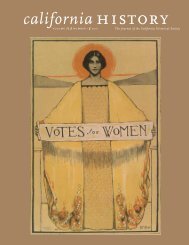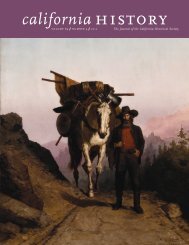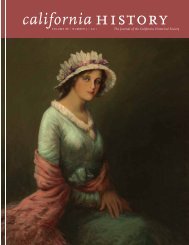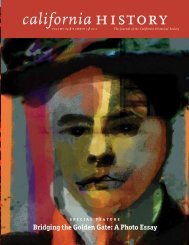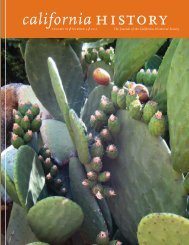Volume 90, Number 1 - California Historical Society
Volume 90, Number 1 - California Historical Society
Volume 90, Number 1 - California Historical Society
Create successful ePaper yourself
Turn your PDF publications into a flip-book with our unique Google optimized e-Paper software.
8<br />
In his illustrated recollection of his adventures in <strong>California</strong>, William Redmond Ryan offered this view<br />
of Monterey in February 1848 and observed: “The portly <strong>California</strong>n, under his ample-brimmed sombrero<br />
and gay serapa, the dark-skinned and half-clad Indian, and the Yankee, in his close European<br />
costume, intermingled or chatting apart in groups of threes and fours, imparted an irresistible charm<br />
of novelty to the scene.” Alfred Sully was disappointed when he arrived the following year and found<br />
Monterey’s prominent “Spanish” residents frosty at first encounter. “They are generally to strangers<br />
somewhat cold in their manners,” he wrote. “But once acquainted all restraint is thrown off.”<br />
Yale Collection of Western Americana, Beinecke Rare Book and Manuscript Library<br />
Señora de la Guerra’s ambivalence toward the<br />
occupiers was aptly summarized by an American<br />
acquaintance, the merchant William Heath<br />
Davis, who married into this society. Prior to the<br />
Mexican War, Davis wrote, the women of <strong>California</strong><br />
“were wholly loyal to their own government<br />
and hated the idea of any change; although they<br />
respected the Americans, treated them with great<br />
cordiality and politeness, and entertained them<br />
hospitably at their homes, they would not countenance<br />
the suggestion that the United States or<br />
any foreign power should assume control of the<br />
country.” Angustias de la Guerra—who followed<br />
Spanish tradition by retaining her maiden name<br />
but was referred to by Davis as Mrs. Jimeno—<br />
<strong>California</strong> History • volume <strong>90</strong> number 1 2012<br />
shared those sentiments and was initially hostile<br />
to invading Americans. “In a patriotic outburst,”<br />
Davis related, she “exclaimed one day that she<br />
would delight to have the ears of the officers of<br />
the United States squadron for a necklace, such<br />
was her hatred of the new rulers of her country.”<br />
But whenever an American officer was taken<br />
sick, he added, “Mrs. Jimeno was the first to visit<br />
the patient and bestow on him the known kindness<br />
so characteristic of the native <strong>California</strong><br />
ladies.” 5<br />
Angustias’s policy of dealing charitably with<br />
Americans in the hope that they would respond<br />
in kind continued after the war, affording Sully<br />
and other officers a gracious hostess to look after



